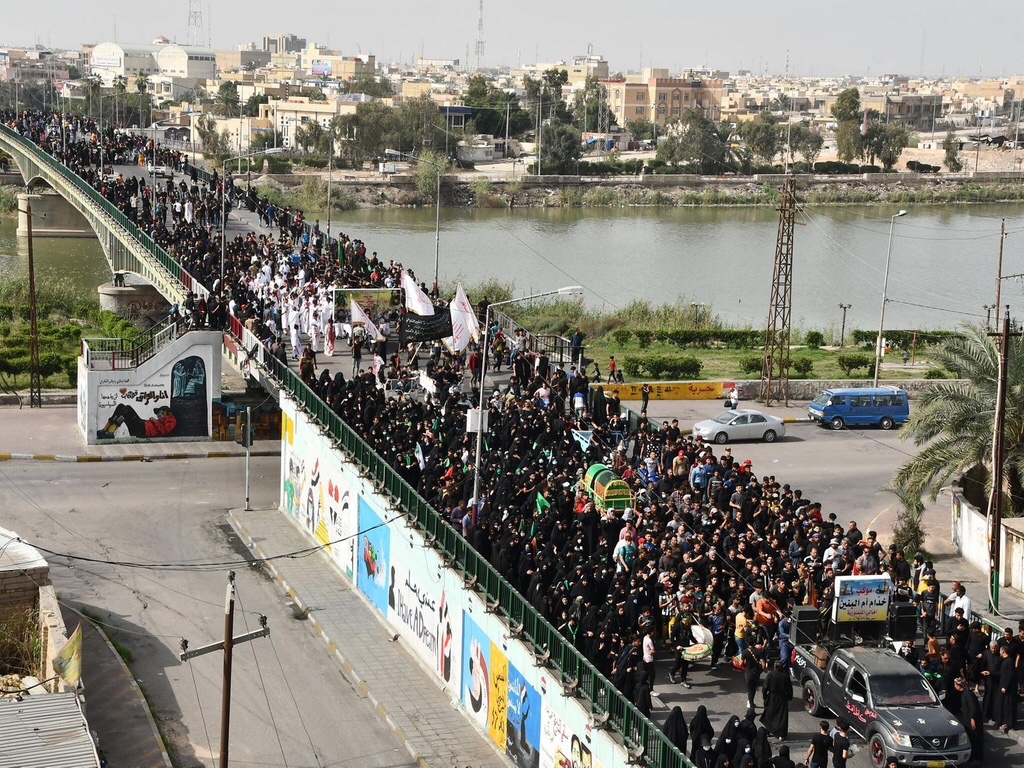Iraqis walk in an empty street in Baghdad on March 22, 2020 amid a curfew to help fight the spread of Covid-19. AP Photo
Iraq’s Health Ministry, struggling to contain the outbreak of Covid-19, appealed on Sunday to influential Shiite cleric Moqtada Al Sadr to endorse a 14-day self-quarantine after thousands ignored its advice to mark a religious occasion.
Iraq has reported 233 cases and 17 deaths from the coronavirus, but many believe the numbers could be much higher as only about 2,000 people have been tested out of 40 million.
The government imposed a week-long curfew and lockdown across Iraq on Monday to prevent transmission of the virus.
On Sunday it extended the curfew until 11pm on March 28. Authorities have also banned all travel between provinces.
Iraqi Health Minister Jaafar Allawi called on Mr Al Sadr to urge people to comply with the ministry’s instructions to self-isolate for 14 days, the ministry said on Sunday.
“We have sent a letter to Moqtada Al Sadr, setting out efforts to address the threat of coronavirus and prevent the spread of this serious epidemic in the country,” it said.

Iraqi Shiite cleric Moqtada Al Sadr delivers a speech to his supporters. AFP
They took to the streets in half of Iraq’s 18 provinces on Saturday to mark the imam’s death in 799.
Videos circulated on social media showed hundreds of pilgrims taking part.

Iraqi Shiite pilgrims stage a procession in the southern city of Nasiriyah to mark the death anniversary of Imam Mousa Al Kadhim on March 21, 2020. AFP
Pilgrims from around the world come to visit and kiss the imam’s shrine, including from neighbouring Iran.
Iran is battling one of the world’s deadliest coronavirus outbreaks with nearly 22,000 cases and more than 1,600 deaths as of Sunday.
But this year flights to and from Iraq are suspended until at least next Saturday because of the virus, and all border crossings outside the semi-automous Kurdish region have been closed.
The situation in the country is “severe and the public must listen to our instructions”, an official from the health ministry told The National.
He warned against public gatherings “because of the great risk of spreading the virus”.

Iranian workers set a temporary emergency hospital in a part of the world’s largest shopping mall complex called ‘Iran Mall’. EPA
On Friday, Iraq’s top Shiite cleric, Grand Ayatollah Ali Al Sistani, urged followers against gathering in large numbers for prayers.
Like many other countries in the region, Iraq has suspended prayers at mosques.
Mr Al Sistani urged Muslims to abide by medical advice on social distancing, but did not advise pilgrims to stay home.
His and the ministry’s calls have done little to convince the public to isolate themselves.
“We don’t even have a proper government, why should we stop our religious pilgrimage and stay home?” asked student Ali Khadim, 24, from Baghdad.
Thousands have taken to the streets and “we will not stay away”, Mr Khadim said.
The UN envoy to Iraq on Sunday added her voice to appeals for the public to follow health precautions.
“In recent days we have noticed that some people are unnecessarily breaking the curfew and some people are not fully abiding by instructions,” Jeanine Hennis-Plasschaert said in Baghdad.
“To those, I would like to say you are endangering yourself, your families, your loved ones and the community.
“Mass gatherings should not take place and this includes sports, cultural events and religious gatherings.”
Up to 25 per cent of the population are defying government calls and are trying to perform their pilgrimage, Ali Al Bayati, a member of the country’s Human Rights Commission, told The National.
“Some people were arrested and given penalties for being outdoors and contributing to the spread of the disease,” Mr Al Bayati said.
Government institutions must make greater efforts to raise health awareness and design programmes on precautions and risks related to the virus, as this is one of the main problems, he said.
Updated: March 23, 2020 01:11 AM
No comments:
Post a Comment